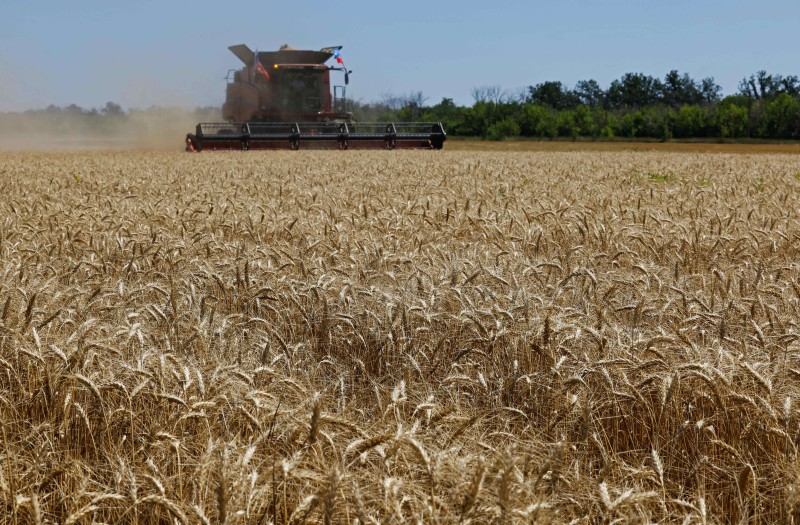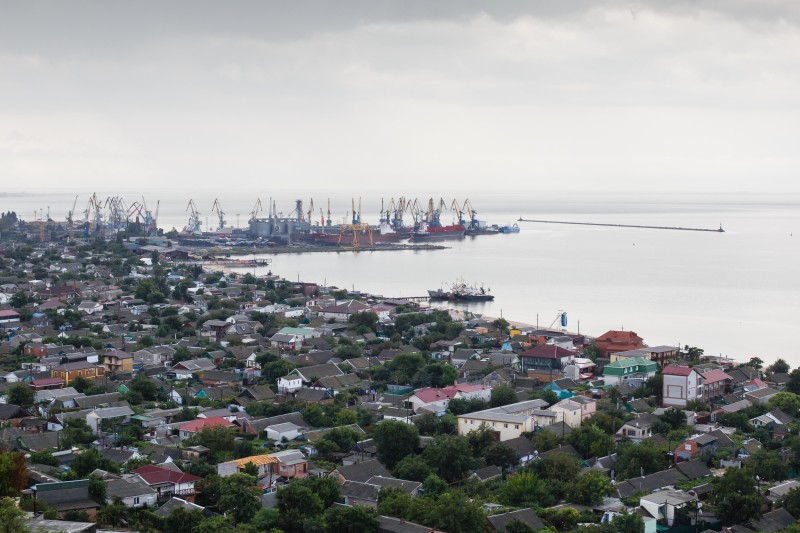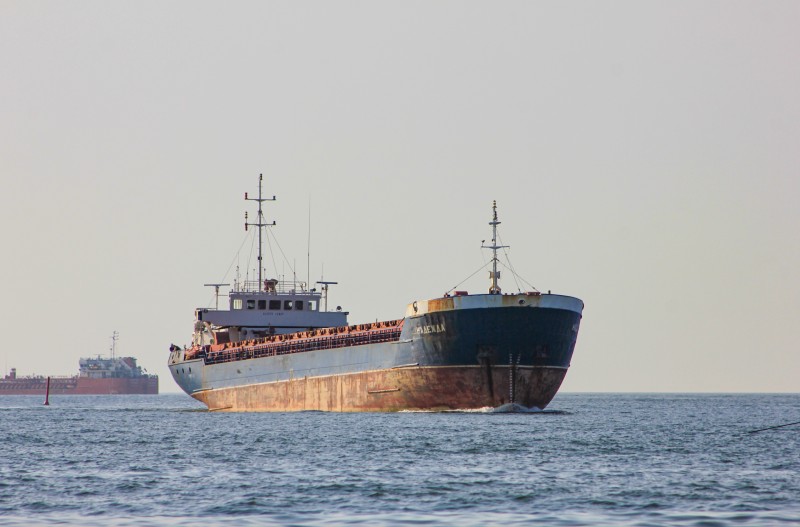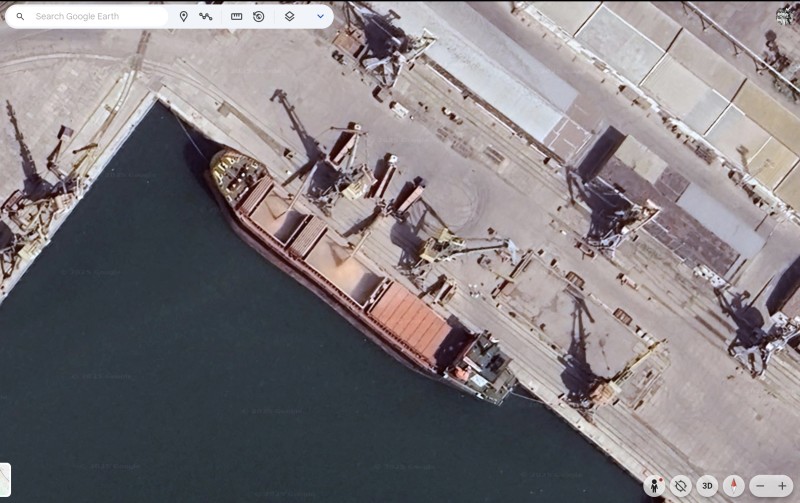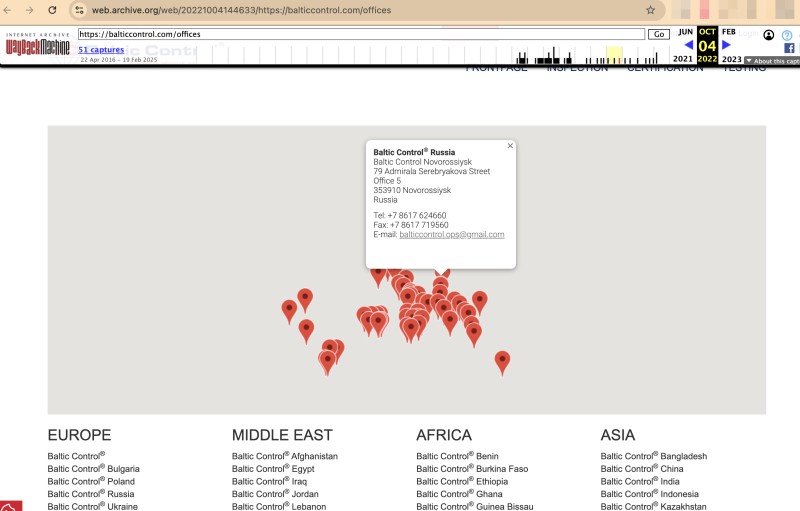“The Sea of Azov has become an internal sea of the Russian Federation,” said Vladimir Putin in a 2022 videoconference, barely suppressing a smile. “That’s a serious thing. Peter the Great fought to gain access to the Sea of Azov.”
That, according to the Russian president, was among the significant achievements of his full-scale invasion of Ukraine, then entering its tenth month.
Among the benefits of this conquest was access to two commercial Ukrainian ports — one in the shattered city of Mariupol, and another in smaller Berdiansk. Now under occupation, both have been repurposed to export Ukrainian grain and other commodities for Russia’s benefit.
However, an investigation led by OCCRP’s Ukrainian member center, Slidstvo.Info, has found evidence suggesting that some of these grain exports may be taking place with Western participation. What appears to be the Russian branch of a company headquartered in Denmark has inspected and certified at least 170,000 tons of grain exported through the port of Berdiansk over the last one and a half years.
The seaport of Berdiansk, Ukraine, occupied by Russia since the first days of the full-scale war.
The Danish company, Baltic Control, is a global player in the business of inspecting shipped cargo. Founded in 1980 and initially focused on Scandinavia’s agricultural trade with the Soviet Union and East Germany, it now operates out of dozens of offices on six continents. In 2023 it was acquired by the Apave Group, a French multinational.
Russian corporate records do not show Baltic Control having any ownership stake in the Russian company inspecting the Berdiansk grain, which operates under the Baltic Control brand as “Baltic Control Novorossiysk.”
But as recently as October 2022 — months after the Russian invasion — Baltic Control still listed an office in Novorossiysk, a Russian port city, on its website. (That entry has since disappeared.) Baltic Control’s 2021/2022 annual report also listed “Baltic Control Novorossiysk” as a related company. And in a conversation with a reporter posing as a grain exporter, a Baltic Control employee said that its Novorossiysk office was open and still functioning.
In addition, the Russian company registry does not show any change in Baltic Control Novorossiysk’s ownership immediately after the Russian invasion. Its sole owner remained the same Russian man who founded it in 2013, Alexander Shalimov.
In December 2014, a minority stake was acquired by a relative, but Shalimov continues to be the company’s majority owner today. Meanwhile, Shalimov also has a separate business relationship with Hugo Pedersen, the founder of Baltic Control: Until 2023, the two men jointly owned another company, also named Baltic Control Novorossiysk, registered in another Russian city. It’s not clear whether this company also played a role in the grain exports. (Pederson left Baltic Control in 2017.)
The Ukrainian government has long insisted that Russian export of Ukrainian grain constitutes a form of pillage — a war crime under international law; independent researchers have estimated the country’s losses in the billions.
Occupying powers have no right to export resources from occupied territory, said Kateryna Rashevska, a lawyer at the Regional Center for Human Rights, a Ukrainian human rights group. Among other things, doing so is a violation of the Hague Regulations.
“Private actors also have a responsibility to avoid harm and not engage in activities that support the occupation and/or human rights violations,” she said.
Apave Group, Baltic Control, and Hugo Pedersen did not respond to requests for comment.
Letters from Occupied Berdyansk
This investigation began with a collection of nearly three dozen letters related to the grain trade in the occupied port of Berdiansk, which were obtained by the Ukrainian hacktivist group KibOrg.
The letters, dated between March 2024 and May 2025, were written by a Russian agricultural company based in occupied Crimea and addressed to another Russian company headquartered in Berdiansk. Each letter describes an upcoming shipment of grain from the port and asks the Berdiansk company to load the ship.
Nine different ships are mentioned in the letters, with some — the Nadezhda, the Sofia, and the Leonid Pestrikov — appearing multiple times. In total, the cargo amounts to over 170,000 tons of grain.
The Nadezhda at sea.
Reporters were unable to track the ships’ destinations, as their Automatic Identification Systems (AIS), a radio-based tracking system used in the maritime industry to monitor ship’s positions, were turned off — a known tactic used by Russian vessels who want to obscure their movements. A few of the ships, including the Leonid Pestrikov and the Kapitan Kokovin, have been sanctioned by the United States. GUR, the Ukrainian military intelligence agency, has flagged at least two of the ships, the Nadezhda and the Sofia, as being involved in the “theft of Ukrainian grain,” with delivery to ports in Turkey and Bangladesh.
The letters also state that the “independent surveying company Baltic Control” must oversee the loading operation, including inspecting the ships’ holds and monitoring the amount and quality of the loaded cargo and the safety of the loading operation.
The letters contain no other information about Baltic Control and do not mention where the company is based. But other documents obtained by KibOrg enabled reporters to track down its registration. A reconciliation statement and an invoice between Kristall-2019, the Berdiansk-based recipient of the letters, and Baltic Control, contain the company’s tax identification number. The company’s full name is given as “Baltic Control Novorossiysk” and its director is listed as Alexander Shalimov.
A satellite image from April 27, 2024 shows a ship being loaded with grain in the occupied Berdiansk port. According to letters obtained by journalists, the Nadezhda was being loaded at the time. This ship matches the Nadezhda in appearance.
Hidden And Not-So-Hidden Ties
On first glance, Baltic Control Novorossiysk and the Danish-based Baltic Control appear to have a clear affiliation: Their websites (balticcontrol.com and balticcontrol.ru) use the same logo and color schemes and offer similar services.
The websites of the Danish "Baltic Control" and the Russian "Baltic Control Novorossiysk."
Neither company makes any mention of the other on its site, and the Danish Baltic Control does not include a Russian affiliate on its map of worldwide offices.
But this was not always the case. An archived version of the Baltic Control site from October 2022 lists “Baltic Control Novorossiysk” as its Russian office and displays the email address [email protected] — the same address that is still listed on the Baltic Control Novorossiysk site.
An archived version of the Baltic Control site from October 2022 shows the company's Novorossiysk branch.
In terms of formal legal ownership, the picture is less clear.
According to its 2021/2022 annual report, Baltic Control reported having a 49 percent stake in Baltic Control Novorossiysk, which is described as one of its related companies, as recently as May 2022. No related companies have been listed in subsequent reports, which are published in a different format (Baltic Control was acquired in 2023).
However, Russian corporate records do not reflect any foreign ownership of the Baltic Control Novorossiysk that documents connect to the Berdiansk port. They show that, since its founding, its sole owner until late last year has been Alexander Shalimov. Though Baltic Control had removed its Russian office from its website by February 2023, there were no significant changes to the Russian company’s ownership structure. Late last year, Shalimov’s ownership stake in the company decreased from 100 percent to 80 percent, with the remaining 20 percent being acquired by a woman who shares his last name.
Separately, reporters found another, identically-named Russian company based in the city of Yeysk. Though this “Baltic Control Novorossiysk” has a different tax ID number and no visible connection to the Berdiansk port, it does show a business relationship between Shalimov and Hugo Pedersen, who founded the Danish Baltic Control in 1980: Between 2009 and 2023, they were the company’s co-owners. (Pederson has maintained his shares, while the rest are now owned by the company itself.)
Neither the Danish Baltic Control, nor Baltic Control Novorossiysk, nor Pedersen responded to detailed questions about these ownership structures and business relationships.
‘This Is Your Branch’
To confirm the relationship between the companies, a reporter called Baltic Control’s Danish head office while posing as a representative of a Russian company inquiring about grain shipments from Berdiansk and Mariupol to South Sudan and Egypt.
The reporter asked about Baltic Control’s Novorossiysk office.
“This is your branch,” she said. “Is it still operational?”
“Yes it is,” the Baltic Control employee answered. “Let me just see here, just a moment.”
On request, he provided the office’s phone number and noted that it belonged to an “Alex Shalimov.”
The reporter then called that number, introducing herself as the representative of a company that wanted to ship grain to Poland and needed Baltic Control’s services to check and certify its shipment.
“Yes, of course we can,” said the man on the line, and followed up with a sales pitch. “Let me put it this way: We are the only ones [working] in Berdiansk. Everyone else is from somewhere else... That means you will be able to see the quality throughout the entire loading process.”
In a subsequent phone conversation with reporters, Shalimov denied that his company worked in Berdiansk, told reporters to “call Ukraine” for any information, and hung up the phone. He did not respond to a follow-up written request for comment.
Additional reporting: Yuliya Radionovich, Niels Fastrup (DR), Lisbeth Quass (DR)
Clarification, July 17, 2025: A line was added to the story to clarify that Hugo Pederson, the founder of Baltic Control, left the company in 2017.
